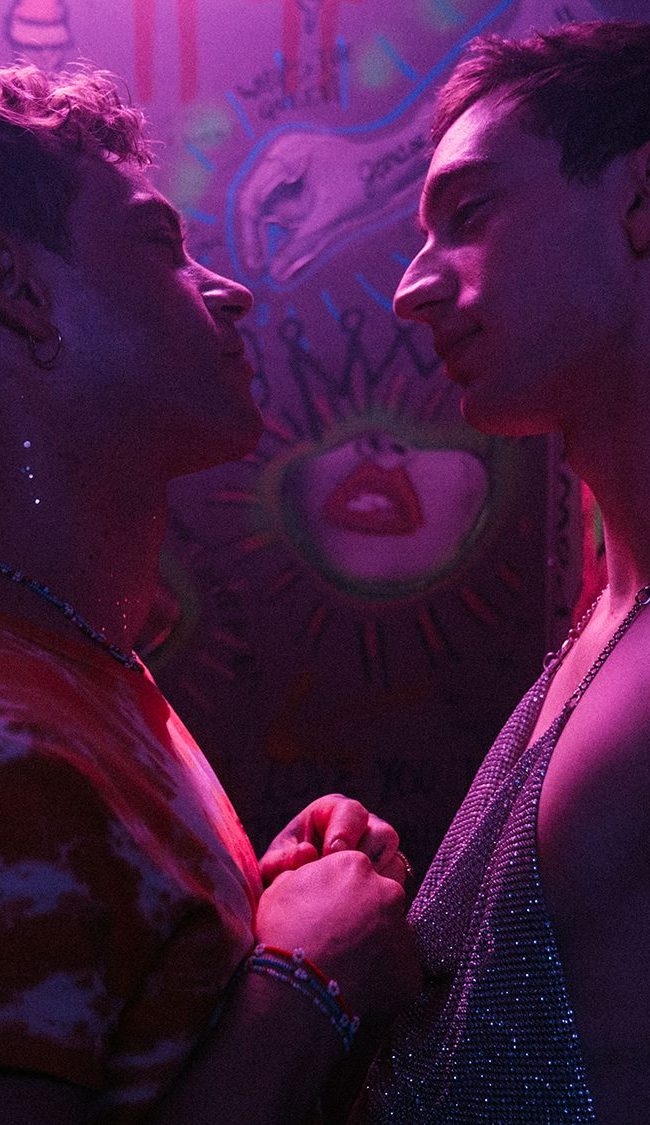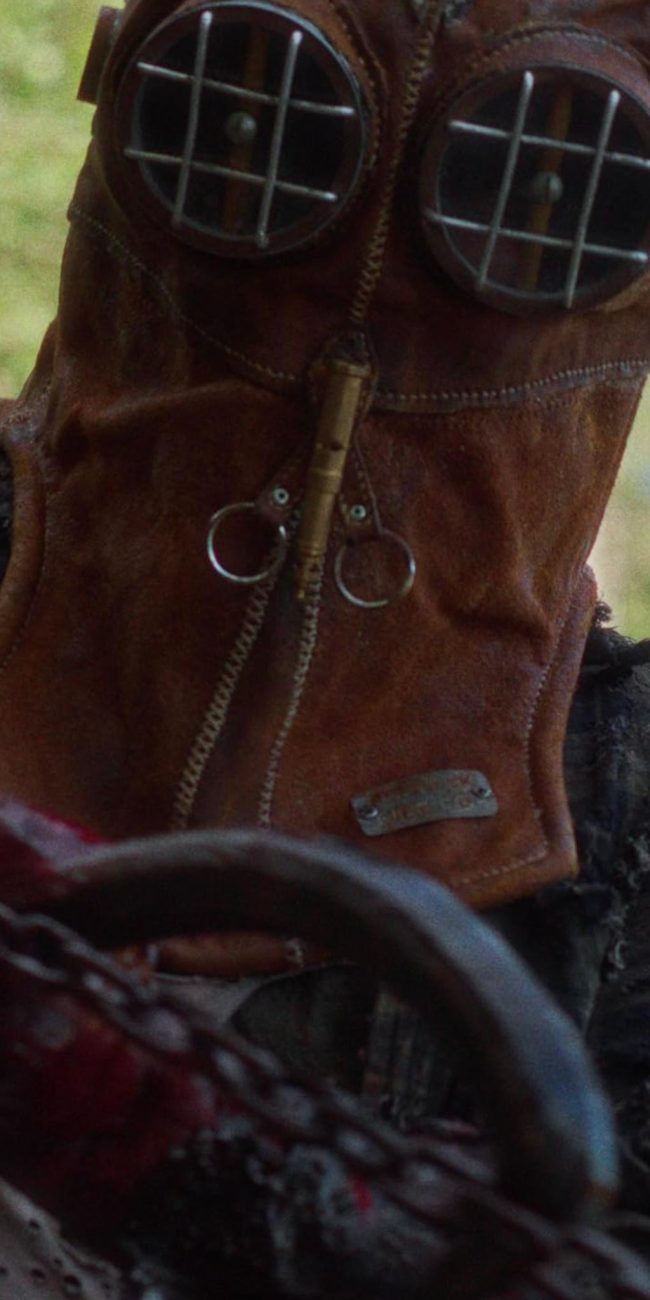A Conversation with Kyle Henry and Paul Soileau (FOURPLAY)
The first time I saw Christeene was when the (NSFW!) PJ Raval-directed video for her electro-rap song “Fix My Dick” came out a couple years ago. It was really funny and dark and dirty on a lot of levels, but grounded in a sophisticated understanding of theatricality, of character, of dramatic payoff. When Christeene performed at Bears in Space in L.A. later that year, she showed up early and just hung out for quite a while, disturbingly in character (her skin looked like the skin of a corpse pulled out of a river), and actually I had no idea that she even was a character. Her live show got Silver Lake’s homogentsia all in a twitter. It was hardcore art that you could dance to; it tapped into something raw and intense and totally of the moment.
Then Christeene turned up in Kyle Henry’s Sundance short Fourplay: Tampa—a wild ride, to say the least—a transgressive comedy that dares to humanize mens-room sex. Turns out Christeene is a character created by Austin-based performer Paul Soileau, who also starred in Henry’s Fourplay: San Francisco, as a completely different cross-dressing character. Both shorts are now segments in the Fourplay feature-length film, which premiered at Frameline and went on to play at Outfest (Henry’s first narrative feature, Room, played at Sundance in 2005). Fourplay is unlike anything else out there—particularly in the Tampa and Skokie segments, Henry’s characters are innocents that find themselves in a bright world of cheerfully taboo-breaking sex. The Austin and San Francisco segments take on a somewhat more serious tone in exploring the strange and cathartic possibilities of sexual expression and connection.
The night before the interview, Christeene put on an explosive show at Los Globos in Silver Lake. Dressed in ripped and worn remains of what might have been lingerie, and covered in streaks of grime and possibly her own excrement, she took control of the stage and the crowd, gyrating, strutting, spitting, showing her “pussy,” coyly smiling, and doing hilarious choreographed routines with her big/smooth and skinny/hairy backup dancers: it was triumphant. I had no idea what to expect from the man behind Christeene. Kyle Henry was at the show wearing an Ingmar-Bergman-in-a-cloud t-shirt; we bonded over our appreciation of the ‘70s TV show Soap.
The next day, I meet Kyle and Paul at the Redcat Theater; they’re smart, engaging, and eager to talk; they’re aware that their work is breaking through and having an impact. Soileau turns out to be a gracious, friendly, healthy-looking Southern gay boy in fashionable eyewear.
Hammer To Nail: How have straight audiences responded to Fourplay, or how did you expect them to respond and was it any different?
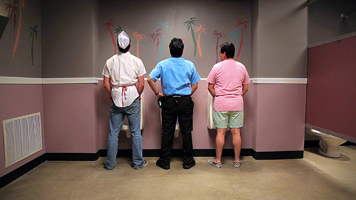 Kyle Henry: I definitely think, when you’re exposed to anyone’s truths, it’s personal, it’s from their community, but you recognize authenticity. And I think anyone—I mean I wasn’t in Germany in the ‘70s, but I get Fassbinder films, I’m not Swedish but I get Ingmar Bergman films, ‘cause they recognize a facet of life that I think maybe those of us that are queer and don’t have problems with, you know, the wing-wang or the dong—are gonna be able to see past that in Fourplay: Tampa and see issues of, like, shame and self-worth and the way we judge each other based on our body types. And I think if you can look past that, if you’re a straight audience—that’s massively there in straight popular culture. I mean, look at how many women are shamed about their body constantly, through the advertising industry, and the issues that they have to face. We wanted to do it in a way that was absurd, surreal comedy, so that also burrows deep into people’s brains. It’s not just some sort of social interest film or social problems film; it’s something that can activate hopefully a catharsis within you. So that’s what I’m looking for.
Kyle Henry: I definitely think, when you’re exposed to anyone’s truths, it’s personal, it’s from their community, but you recognize authenticity. And I think anyone—I mean I wasn’t in Germany in the ‘70s, but I get Fassbinder films, I’m not Swedish but I get Ingmar Bergman films, ‘cause they recognize a facet of life that I think maybe those of us that are queer and don’t have problems with, you know, the wing-wang or the dong—are gonna be able to see past that in Fourplay: Tampa and see issues of, like, shame and self-worth and the way we judge each other based on our body types. And I think if you can look past that, if you’re a straight audience—that’s massively there in straight popular culture. I mean, look at how many women are shamed about their body constantly, through the advertising industry, and the issues that they have to face. We wanted to do it in a way that was absurd, surreal comedy, so that also burrows deep into people’s brains. It’s not just some sort of social interest film or social problems film; it’s something that can activate hopefully a catharsis within you. So that’s what I’m looking for.
H2N: And what kind of reactions have you actually had?
KH: It’s different. Outfest, when I showed it last year: uproarious laughter, when every new ridiculous character that would enter that bathroom, like—“Oh no, oh no, oh no”—until it builds to its crazy fantasy fictional historical character orgy at the end. At Sundance, I think half the audience was laughing uproariously and half the audience was sort of cringing, and sinking lower, lower, lower into seats like, “Oh no, they’re gonna show us dick. Oh no, they’re gonna show us cum, or they’re gonna show us things that I’m not supposed to see because…” Yeah, and we’re challenging issues that people have with spirituality and the body. You know, Christ has been appropriated and is used as this cudgel against queer people, and I think if Christ were alive today—I mean he was hanging out with hookers and tax collectors and you know, a lot of guys together roamin’ the fields. I think Christ would be someone who would offer of himself and his body to somebody who has issues of shame about their own body, to make them feel good. It’s a simple concept, but I guess where it’s transgressive for some people is that we’re just indoctrinated from the time we’re very very young in these mythologies, and when you throw up something counter to that perhaps they’re being violated. I hope they’re being liberated in some way. Often films that I saw when I was young that shocked or appalled me in some way stuck with me, and later, years later, when I was an adult or had gone through enough experiences that informed my experience of life, I was able to see those films anew, as having these buried truths.
H2N: So how do you take those sort of heady concepts and turn them into broad comedy? Or is it just intuitive?
KH: I think you look for buried treasure in the subtext of material. And first you look for material that moves you emotionally, to laughter or to tears. And then if you have a brain—and you should use your brain as a filmmaker—you investigate why am I laughing, why am I crying; am I furthering through the use of these emotions some sort of progressive thinking or am I only reinforcing regressive stereotypes? I like to speak intellectually about film and first what I’m looking for is that emotional experience. I did not write these short films and I think the writers themselves perhaps wouldn’t articulate what their agendas were, or what the meanings were in the work, but I saw the authenticity of experience in the stories they were writing and wanted to bring them to life.
H2N: Why don’t you tell us a little about the writers—Carlos Treviño wrote three of them and…
KH: Jessica Hedrick wrote one of them. Carlos is a man of many talents. He has been a theater director, an actor, a man about town in Austin for years; he’s also a backup dancer for Christeene, so there’s a lot of overlap here. He and I are also partners, romantic partners and partners in crime with our creative work.
Paul Soileau: [Embittered voice] Romaantic… [all laugh]
KH: Hey, 13 years! We try to keep the romance alive! I wanna make no mistake that somehow we’re just business partners. And I just challenged—Carlos knew that I wanted to make short films about sex. And I challenged him to write stories that were personal in some way but also were radically different from each other. And the same for Jessica. She kind of formed the fourth link in the chain, with her bestial lesbian story. I told them to find characters or situations where deviant behavior is going on that we could turn on its head. We could give people hopefully some way in to the emotions of the characters. And just not stand back and see it as sort of shock-art-porn.
H2N: My own experience of seeing both of your work is that it seems sort of out of the blue and I don’t have a context for it in terms of other work—that’s happening right now anyway. Are you part of a scene?
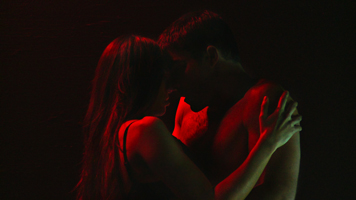 PS: I think if you said we were part of a scene it would be that we all met in Austin, Texas, and we were all very creative and present in that city, working on things that we needed to work on that would inspire us in a small town that has a lot of talent and a lot of creativity and inspiration, but like I said Austin would just be our scene, I guess? But, um, we all met each other through work. I met Carlos through theater. I met my other backup dancer through theater. I met Kyle through PJ Raval, who is the D.P. [of Fourplay], and who is my co-producer with all of the Christeene material. So that would be our scene, but personally I think we are making work that is out of the blue, isn’t from a normal processor, and I think that personally as an artist when I create and I make work—I think you feel the same way about the sexuality of this film, as you were saying—is that when it all boils down to it I really sit down and I first think, you know, what is it that I would want to see? As a gay man, growing up, from small-town Lake Charles, Louisiana. Of all the things I was never given, or never learned. Or, you know, what is it I would want to see when I walk into that big white empty room? It all starts right there, with all the things that I’ve been fed. I think that’s why our work stands out the way it does, is you have to listen to what your gut’s telling you, and what are the things that are inspiring. Those emotions. You were saying, “What makes me laugh, what makes me cry?” And how do I channel those feelings into a productive piece of work? That isn’t exploiting those emotions, that isn’t like, “Oh this is shocking, so I’m gonna make it even more shocking so I will shock people!” It’s like no, no, if this is shocking what’s the reverse of that? Like where’s the soul of that, or where’s the silence of that?
PS: I think if you said we were part of a scene it would be that we all met in Austin, Texas, and we were all very creative and present in that city, working on things that we needed to work on that would inspire us in a small town that has a lot of talent and a lot of creativity and inspiration, but like I said Austin would just be our scene, I guess? But, um, we all met each other through work. I met Carlos through theater. I met my other backup dancer through theater. I met Kyle through PJ Raval, who is the D.P. [of Fourplay], and who is my co-producer with all of the Christeene material. So that would be our scene, but personally I think we are making work that is out of the blue, isn’t from a normal processor, and I think that personally as an artist when I create and I make work—I think you feel the same way about the sexuality of this film, as you were saying—is that when it all boils down to it I really sit down and I first think, you know, what is it that I would want to see? As a gay man, growing up, from small-town Lake Charles, Louisiana. Of all the things I was never given, or never learned. Or, you know, what is it I would want to see when I walk into that big white empty room? It all starts right there, with all the things that I’ve been fed. I think that’s why our work stands out the way it does, is you have to listen to what your gut’s telling you, and what are the things that are inspiring. Those emotions. You were saying, “What makes me laugh, what makes me cry?” And how do I channel those feelings into a productive piece of work? That isn’t exploiting those emotions, that isn’t like, “Oh this is shocking, so I’m gonna make it even more shocking so I will shock people!” It’s like no, no, if this is shocking what’s the reverse of that? Like where’s the soul of that, or where’s the silence of that?
KH: Richard Linklater talks about Austin being a place that has always attracted people who are searching, searching for authenticity or truth, and aren’t perhaps beguiled by the mythology of cities like New York or Los Angeles. New York is a city where you go to dominate everyone else and make it, because if you can make it there you can make it anywhere. Los Angeles is the place where you go to re-create, you know everybody and re-create yourself into some kind of dream image, you know. I think Austin’s a place you go to do your own thing, and it attracts people for that reason. I saw Slacker when I was 20 years old and I immediately said, “That’s the city I want to move to, that’s the kind of people I wanna meet, that’s the place that I wanna be.” It’s a place where you can be anything and you can meet all these different types of people, and have these experiences and continue to change and evolve as a human being. Whether that’s as an artist, or whether it’s just as a human being, I wanna continue to change, and learn, and grow until I’m dead, and that’s first and foremost I think the scene we’re in—is wanting to be alive as fully as possible, with our work. Financial considerations—I wouldn’t say be damned, but there are times in my life where I’ve made choices where I just said you know this is what I think is the truth, and roll the dice and throw it out there and we’ll see.
PS: One thing about Austin too is we’ve both lived in big cities—I’ve lived in New York, and I’ve been around, for a while, and um [all laugh] ugh, can’t you hear it in my voice? But Austin lacks a lot of selfish ego. It’s a very collaborative environment. In terms of the queer culture there, the dykes, the fags, we all hang out together, we all go to the same bars, it’s not segregated in that way that New York or any other big city is, you know? But artistically that really shocked me, because in New York—who’s got time to help someone else out? It’s always—it’s your time, your time is precious, you have your job and—something about Austin that really charmed me, and made me stay there, was the fact that I could sit with other artists who were really inspiring me and showing me work that I’ve never ever seen or could even possibly think of, and they let you in, and they say what the hell are you making? And then let’s sit down and let’s put these two things together and see what kind of creature we can make out of it. It’s really inspiring in that way. And I think that’s what makes it very special too. And it’s in the heart of Texas, like, what the hell? You’re in Mordor, for godsakes, making crazy queer art, it’s like, let’s go!
KH: You’re the blueberry in a sea of tomato sauce…
PS: The rose in the thorn bush!
KH: And that I think makes us all combative—at least the Southern freak connection that we all have is that we’ve had to be fighting to articulate who we are, consequences be fucking damned, since the time we were very young. We weren’t in some liberal enclave where it was free to be you and me since the time we were 2 to 3. It was like no, we had to fight to be who we are. And why should it change just because we change locales, or are at different stages of our life?
H2N: Your work is obviously connecting with audiences in different parts of the world, and what you’re doing is pretty extreme in terms of what’s been seen before, so do you have any concept of how audiences, or consciousness in general has been evolving? To where your work is able to resonate with people?
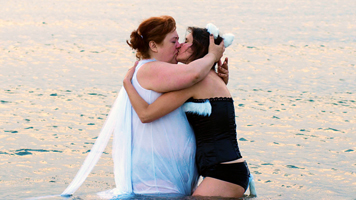 KH: I think perhaps our work is extreme for right now, but I think we’re part of, always, people who speak dark truths; part of an eternal return. There’s nothing—I mean please—Fassbinder? Bergman? Persona? Anything that Fassbinder made? I mean, is the work we’re doing any more extreme, and extreme in terms of the circumstances, let’s say, that Fassbinder lived and worked in? In terms of how homosexuals were perceived? That work is fierce, and that work is fierce also in taking on not only queer identity, let’s say, in Germany, but the legacy of a Nazi past and fascism and class-consciousness. Perhaps the reason why that work inspires me, the work from the ‘60s and ‘70s, of the counter-culture let’s say, or work that was critiquing the world around them, is there’s greater stakes than just the creation of art. We’re fighting for our own survival as human beings on this planet right now. If you’re not awake enough I want to smack you around a little bit so you wake up and are alive a little bit more, ‘cause we’ve got some serious shit to figure out. And the stakes I think are even much higher than perhaps at the height of the Cold War. I mean I was a history major at Rice University so maybe if I’m throwing too much history [KH laughs], if I’m throwing too much history in here… I am conscious at least when I’m making my work that I’m gonna have to live with what I make, and I’m gonna have to be accountable for what I said, at the end of my life, and so if I don’t do the best I possibly can do with every film I make—because look, we could be hit by a bus tomorrow—then I just wanna make sure that I’m bringing everything I know about the world to bear. So with sex, let’s say, and Fourplay, we live in a culture that is probably freer than it’s ever been for the LGBT community; we’re gaining more and more rights, but until let’s say those rights are enshrined in our Constitution they can all be taken away. There have been plenty of other periods in history where LGBT people—say Weimar Germany—had a lot of status, and it wasn’t enshrined in the Constitution, the politics changed radically, the economy changed radically, and we were pointed out as scapegoats, you know, to be targeted and exterminated. So at least with issues of shame and sex, I’m hoping that we can all laugh at things and not be so fearful, and erase some of the shame, so that, let’s say, if a straight person sees Fourplay, they’re gonna come away and not see us as so much of a threat, but as part of, like, a ridiculous pageant of life, and hopefully connect with the insane, absurd things they have in their own sexual history. ‘Cause believe me, gay or straight, sex is crazy and we all have strange stories that are meaningful for us but perhaps we’re not gonna share with our friends and family, but they need to be acknowledged somewhere, that that’s sex. That’s our sexual lives.
KH: I think perhaps our work is extreme for right now, but I think we’re part of, always, people who speak dark truths; part of an eternal return. There’s nothing—I mean please—Fassbinder? Bergman? Persona? Anything that Fassbinder made? I mean, is the work we’re doing any more extreme, and extreme in terms of the circumstances, let’s say, that Fassbinder lived and worked in? In terms of how homosexuals were perceived? That work is fierce, and that work is fierce also in taking on not only queer identity, let’s say, in Germany, but the legacy of a Nazi past and fascism and class-consciousness. Perhaps the reason why that work inspires me, the work from the ‘60s and ‘70s, of the counter-culture let’s say, or work that was critiquing the world around them, is there’s greater stakes than just the creation of art. We’re fighting for our own survival as human beings on this planet right now. If you’re not awake enough I want to smack you around a little bit so you wake up and are alive a little bit more, ‘cause we’ve got some serious shit to figure out. And the stakes I think are even much higher than perhaps at the height of the Cold War. I mean I was a history major at Rice University so maybe if I’m throwing too much history [KH laughs], if I’m throwing too much history in here… I am conscious at least when I’m making my work that I’m gonna have to live with what I make, and I’m gonna have to be accountable for what I said, at the end of my life, and so if I don’t do the best I possibly can do with every film I make—because look, we could be hit by a bus tomorrow—then I just wanna make sure that I’m bringing everything I know about the world to bear. So with sex, let’s say, and Fourplay, we live in a culture that is probably freer than it’s ever been for the LGBT community; we’re gaining more and more rights, but until let’s say those rights are enshrined in our Constitution they can all be taken away. There have been plenty of other periods in history where LGBT people—say Weimar Germany—had a lot of status, and it wasn’t enshrined in the Constitution, the politics changed radically, the economy changed radically, and we were pointed out as scapegoats, you know, to be targeted and exterminated. So at least with issues of shame and sex, I’m hoping that we can all laugh at things and not be so fearful, and erase some of the shame, so that, let’s say, if a straight person sees Fourplay, they’re gonna come away and not see us as so much of a threat, but as part of, like, a ridiculous pageant of life, and hopefully connect with the insane, absurd things they have in their own sexual history. ‘Cause believe me, gay or straight, sex is crazy and we all have strange stories that are meaningful for us but perhaps we’re not gonna share with our friends and family, but they need to be acknowledged somewhere, that that’s sex. That’s our sexual lives.
PS: Yeah and I think the work that we’re doing and we’re reaching all these different people, and these people are responding to it, for me personally it’s a return to something that’s always been there. You’ve somehow found a hole and you’ve tapped it, you know… [all laugh, as Paul realizes what he just said] Look that up in your Funk & Wagnalls! But as a creative person you feel that when you tap that! But you instantly feel this rush, like the fluid runs through you, it’s a possession—personally as a performer it’s a possession, and you’re drinking from the font of some very strong history, some very strong inspiration from people who did this way before you did. But it’s relating to people because they also have that connection within them—straight, gay, I don’t care who the hell you are; when you see this work it’s tapping into something inside of you, and for me personally these people—everyone right now needs a good smack across the face. With a dick. [all laugh] My biggest thing is right now we’re being fed—the communication between humans right now is ridiculous with all the outlets we have, and everyone’s getting fed a lot of shit right now, and it’s sugarcoated. I always say I wanna deliver you the truth, the honest truth, the raw, honest truth, not the sugar, and then you decide—you look at what you eat every day and then you look at what you’re getting right now, on the stage, or from this film, and you tell me which one is honest and you tell me which one you really know that you need. And I think the work is doing that to people; it’s making them really pull back from this media monster we live within, and say, “Oh wait, this is actually real. This has no seasoning.” Which is a sin from a Louisiana boy, not to put seasoning on something. [all laugh] But this is the raw deal, and I think this work, for us, tapping into the history of it, it’s always gonna be there if you’re open enough to tap into it. Once you start to deliver your gift, your product from that flow of history, it’s gonna hit other people, and those people are gonna start tapping in. And then you’re making a difference with some people’s brains.
H2N: Maybe something’s shifted in people’s consciousness, at least in the gay community, from the whole phenomenon of internet dating. Like I’m still shocked that people will randomly put their hard-on up online so people can look at it, and yet it’s become a very socially-acceptable thing, and maybe that’s become a liberating thing and maybe it’s created a desire for more truth about sexuality, or an openness to that?
KH: There’s not a lot of genitalia in Fourplay. It’s used very strategically. And in most cases—the sex scenes themselves—we focus on the face, because that’s the thing that attracts us to each other, is what’s going on in our brains and not what’s photographed between our crotches and posted online, and I think if anything what we’re doing in Fourplay is picking body types and personas that aren’t normally seen, aren’t normally sexualized, to say we all have this ability to connect with each other, but it’s through who we are as human beings, and not as products to be consumed, and one thing that disturbs me about certain sites… sexuality is about taking things in through your eyes, especially if you’re a man—I recognize that. My body reacts a certain way when I see certain things. But I didn’t want to eroticize what you were seeing, and I didn’t want to turn it into soft-core porn. It’s about getting into the brains of the people while they’re engaged in the actions, so you can say, “Yeah, I’ve been there,” not, “Ooh that’s hot; look at these two guys without their shirts on,” or, “Look at this body that looks real hot under that incredible lighting, it looks like candy, I wanna eat it.” No, I wanna be up in their faces and see how they’re changing. See how something’s going on in their brains. And I think the best sexual experiences that any of us have had is when we connect to another human being, or with something within ourselves where we go, “Wow, life is so much more than what I thought it was, I didn’t know I could have this connection with this person, I didn’t know life could be this good.”
PS: I totally disagree. [all laugh] Give me the dirty picture, give me the candy body. [all laugh] I’m single, girl; you have a husband. All you queens with your husbands at home can you think about the single people for a little while? Who need that Candyland? [more laughter]
H2N: I guess then maybe same question for you then, because your work—and I totally agree about Fourplay—but Christeene is a different animal where it is very much about raw sexuality, and maybe that’s—I’m asking the same stupid question again, but maybe that’s reflecting something in the culture?
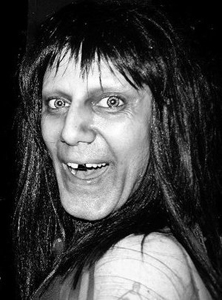 PS: Oh Lord yes, I mean it’s the same thing he said about his film, like I’m not gonna give you no candy body, I mean look at the picture you’re getting here, like we’re breaking every rule of what it is to be an attractive gay person. And gender. And what is a drag queen? What have drag queens become? Not what have they become but look how popular drag queens are right now—thank you RuPaul and the television show, but that’s such a specific style of drag queen. The people we’re giving you on that stage—you’ve got this dude who’s covered in hair, T-Gravel. Moles, hair, smells like a crusty hippie, and then you have C-Baby, this…
PS: Oh Lord yes, I mean it’s the same thing he said about his film, like I’m not gonna give you no candy body, I mean look at the picture you’re getting here, like we’re breaking every rule of what it is to be an attractive gay person. And gender. And what is a drag queen? What have drag queens become? Not what have they become but look how popular drag queens are right now—thank you RuPaul and the television show, but that’s such a specific style of drag queen. The people we’re giving you on that stage—you’ve got this dude who’s covered in hair, T-Gravel. Moles, hair, smells like a crusty hippie, and then you have C-Baby, this…
KH: Watch how you describe him!
PS: I know girl! No, C-Baby’s like this massive truck of a man, and he’s comin’ at you in a pair of women’s panties! And a baseball cap, and glasses—they both wear their glasses. And you know like I said before we’re all performers, we’re all in theater, we’re all theater whores. We know what it is to entertain, and we know what it is to decorate, to perform, to please an audience in the right way. And for me it’s like I’m gonna destroy all these molds we have about what the hell is attractive. You wanna get on Grindr, you wanna look at the pictures of those dicks and stuff? You wanna go to that particular man-mall and all the other man-malls online, and you will see the same store; it’s the same damn store you go to when you go to a mall in America. You see the same damn clothes, the same damn shoes everybody wears—don’t get me started. So let’s put this creature in front of you. Is it a man? Is it a woman? I don’t know. It has a dick. But it’s got long hair, and it talks like a lady and it’s wearing heels. Got nails on. But it’s covered in dirt, and God, Lord knows what else bodily fluids, you know, and then there’s these two boys behind her. Are they gay, are they straight? We’re not giving you the formula. We’re gonna tap into everything you got inside of you, and one fish inside that brain of yours is gonna bite on something. And when that fish bites we are gonna pull that hook, hard, you know, and pull you out of that damn tank. To where that fish hits the ground, or hits another tank and has to survive within that new environment.
KH: Which we don’t—I hate to bust it again, but your Soap reference—when I was growing up my heroes were people like Norman Lear, and these people very in popular media were busting stereotypes, breaking down walls. You know, Susan Harris was a writer for Maude—the first TV show that had a main character have an abortion. If someone were to have an abortion on a major television show now, you and other people would probably think, “My God, that is so out of the norm, that is so daring, that is so barrier-breaking.” It’s like it’s been before; somebody was doing this. I don’t know what kind of electro-shock treatment we went through in the ‘80s, but something was at a certain point jerry-rigged around in our culture, where the scary monsters had come out and we wanted to put them all back in the box, and I think sometimes within the queer community what Christeene does is take the scary monsters out of the box. Things like desire, things like we can’t control who we’re attracted to, or in some cases what we’re attracted to.
PS: There’s no control.
KH: There’s no control over id and other kinds of things, and that’s fine, we have to acknowledge that place. We have to have a place to acknowledge it. I think when people go to see a Christeene performance what they’re turned on by is—yeah, let’s go crazy, let’s have this place where all the scary monsters come out and we can dance with them.
PS: And celebrate them.
KH: And have fun and celebrate them and not be afraid we’re freaks because we actually enjoy that part of ourselves, which we’re told to repress and not acknowledge is there.
PS: For me, I mean the biggest beef I have, and it’s always been from where I grew up and just the whole process of heteronormativeness and assimilation—you know, we’re getting our rights, we’re getting all these rights and we’re becoming straight people in the process. We’re putting our demons away. We’re locking them up, we’re silencing them, we’re drugging them so we can obtain what we want. A lot of people are doing that and to me that’s—I’m 36 and I’ve come out a million times and a million ways and you always think you’re out. You’re never out. You are continuously coming out because you’re realizing new things about yourself, about your culture, and Christeene reminds you that you better not frickin’ assimilate yourself to this norm. If you’re gonna get rights, and if you’re gonna be granted all of these rights that we want written down and chiseled into stone, you better bring yourself to the table, and if they don’t accept what you got at that table, then you say no thank you, no contract signed, I don’t want it. And Christeene for me reminds people that you have to present everything that you are made up of and it has to go onto the table and it has to be recognized and it has to be accepted on those terms.
H2N: I have to laugh because one of the questions I prepared was “Are you political?” [all laugh]
PS: Absolutely not! To quote Joan Crawford, “I never discuss politics or religion.”
H2N: I guess that’s a testimony to how organic your work is, where none of the politics are on the surface. Which brings me to—and I almost don’t want to talk about it because it’s so boring, but I’m sure you saw the whole internet controversy about Christeene, that supposedly she’s doing some kind of a minstrel show…
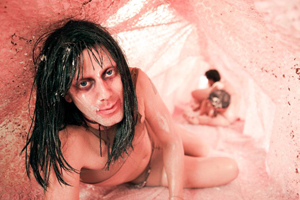 PS: Yeah, they said that I was the next Shirley Q. Liquor, and all that, and I mean I’ve said it before, it’s like I would much rather have people become upset, feel these things, to bring up this conversation, than not feel a damn thing at all like most of what media is giving people, which is just numbing. But the hardest thing for me is—I was really new to this bombardment of internet online comments; I’d never been in this position before, this is all new—so these people just sit at home on their couch and they throw these bombs at you in the safety of their home. My biggest beef with that is if you’re going to drop a bomb and you’re gonna say those things, those loaded frickin’ criticisms, then you need to be able to sit down and discuss it with me. And I wanna have those discussions with people because I am just as new and curious about what this thing is coming out of me—I mean I don’t control Christeene; I don’t strategically plan Christeene’s next look or phase, you know? It comes out. As long as I’m not hurting someone—the message is positive, and that’s the direction I send it in. But I really get upset when people attack and they can’t back it up, or they can’t sit down and have a positive, constructive conversation about why is this bothering you. What, in our community—what nerves does it hit? Why is it hitting those nerves? And—let’s discuss.
PS: Yeah, they said that I was the next Shirley Q. Liquor, and all that, and I mean I’ve said it before, it’s like I would much rather have people become upset, feel these things, to bring up this conversation, than not feel a damn thing at all like most of what media is giving people, which is just numbing. But the hardest thing for me is—I was really new to this bombardment of internet online comments; I’d never been in this position before, this is all new—so these people just sit at home on their couch and they throw these bombs at you in the safety of their home. My biggest beef with that is if you’re going to drop a bomb and you’re gonna say those things, those loaded frickin’ criticisms, then you need to be able to sit down and discuss it with me. And I wanna have those discussions with people because I am just as new and curious about what this thing is coming out of me—I mean I don’t control Christeene; I don’t strategically plan Christeene’s next look or phase, you know? It comes out. As long as I’m not hurting someone—the message is positive, and that’s the direction I send it in. But I really get upset when people attack and they can’t back it up, or they can’t sit down and have a positive, constructive conversation about why is this bothering you. What, in our community—what nerves does it hit? Why is it hitting those nerves? And—let’s discuss.
KH: I don’t mind when people get upset with my work; actually I’m always shocked when people aren’t upset. It’s like, “What? Nobody here asking any hard questions, what’s going on?” Because I want to have a cultural conversation, I want to have the opportunity to have somebody be confronted with something they don’t really understand. Maybe they only have an emotional reaction to it at first. The first time I saw any Chantal Akerman film, or Godard film, it was like, “What the hell is this? That hurt my brain, I don’t like that.” Maybe I need to figure it out. Maybe I can hate it for a couple of years, then give another one a try and then go, “Oh maybe it has something there and it bugged me enough that I came back to it because I had to figure it out.” I hope that if we’re hating on something we’re trying to figure out and articulate why. And then perhaps we’re re-testing that theory that we had, or that hypothesis to see if it’s really true, or is it because it’s something that’s going on inside of us, that’s bringing up emotions that we didn’t know we had, or we don’t know how to deal with.
PS: I think that’s a big part of it.
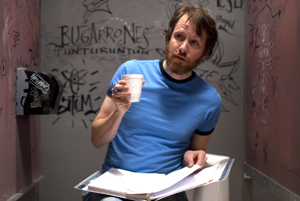 KH: For example, the first time I was ever hit on by another man was in college when I was a freshman, and the first thing I did was run home and tell everyone I knew, like, “Can you believe this gay guy thought I was gay? Oh I am outraged, I cannot believe this happened!” And I called up my parents, everyone else I knew, oh it was terrible, terrible! But of course it was having a huge reaction in me because that person saw something within me that they were responding to. Like everyone knew I was gay except me. The joke was on me, in terms of my coming out process. And when it dawned on me, like, “Oooh, that’s why,” you know, it started a process within me. So sometimes we have to shock or offend first, to get things flowing, so that conversations can occur.
KH: For example, the first time I was ever hit on by another man was in college when I was a freshman, and the first thing I did was run home and tell everyone I knew, like, “Can you believe this gay guy thought I was gay? Oh I am outraged, I cannot believe this happened!” And I called up my parents, everyone else I knew, oh it was terrible, terrible! But of course it was having a huge reaction in me because that person saw something within me that they were responding to. Like everyone knew I was gay except me. The joke was on me, in terms of my coming out process. And when it dawned on me, like, “Oooh, that’s why,” you know, it started a process within me. So sometimes we have to shock or offend first, to get things flowing, so that conversations can occur.
H2N: So I guess you’re out breaking barriers and I mean like John Waters it might be work that people look back on as meaningful but in the time it’s being made there might be a part of your own community that’s getting it or not relating to it, or doesn’t have the mindset of seeing things change and evolve.
PS: Right, that don’t want to see. And I can’t think forward that way but I think…
KH: I think there’s a large enough community that wants to support us now that—I don’t wanna be honored 20 years from now…
PS: Hell no. [all laugh]
KH: I would like to be able to make house payments!
PS: It’s what’s present right now. And all I know is that the work I’m making is putting a dent in my community. For some reason thank goodness it’s reaching people, and it kicked a big hole into some people. And that—like Kyle said, when I die I want to make sure I contributed something to my people. And it’s just the way that the fates have decided that this is who I am and this is how I’m gonna deliver my message is through this form, and once you accept that, you understand what your gift is—how you’re destined for something, it’s like Patton, you know. [KH laughs] No, listen, I love the quote in Patton, I love that movie, because it’s all about destiny and it’s about—and I’m just George C. Scottin’ it up, but like he was connected to his past; he went to those battlefields and he was like you know, “I was in this war, years ago,” but the one thing he always said in that film was, “I know that I’m destined for something great, and what it is I’m never gonna know. I don’t understand what’s happening to me, I have these feelings inside of me; I know I’m destined to do something,” and it’s like when you tap in and you understand the gifts given to you.
KH: I feel that everyone has those feelings in them, and those feelings are that desire to connect and to have a real impact, and it can be within your community, it could be within your family or your church. Whatever your part of your community, you want to have significance to your life.
PS: And a voice.
KH: A voice, and people hearing you, and you also listening to them, and changing and growing. And it’s one thing about the Internet: I don’t know if social media is making us better people. People are asking those questions; there are studies going on and we need to be asking those questions of ourselves. Are we more connected, are we more empowered, or is this enslaving us to our own little computer isolation tanks? And that’s the nice thing about body-to-body connection, whether it’s people coming together one-on-one, in a performance or in a theater, you feel alive in a way, and you feel discombobulated, and you don’t feel safe, you’re like the animal in the wild, in the forest, having to look out for yourself in a way that you’re not when you’re at your computer in your chair.
PS: Which is ridiculous because before this shit we all lived in the wild, and we all went out and we were inspired by the unknown and the uncontrollable, so these pods we live in—we are controlling our own environment. So how ridiculous is that, to be—what you just said. “I’m going to go to the theater and be thrown into the wild.” Like, girl, you know what I mean? I mean isn’t that insane? It’s become that!
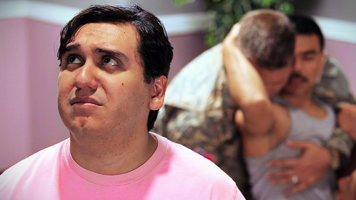 KH: It’s like the feelies in Brave New World, where everyone goes and sees these, like, hyper-movie experiences, so they can have, “You’re gonna be a jungle cat, a jungle cat movie is playing.” We can have those experiences and not necessarily need them to be mediated. I think our work comes from—it’s from life, it’s not through mediation. People ask, “What filmmakers inspire you?” and it’s like it wasn’t film that inspired me, it was life that inspired me, and I found films that matched up with my own experiences or pointed a way towards having more experiences that validated somebody also knowing things about life and existence, and I thought, “Ah, that’s true,” and they’re validating. When I saw Altman’s Nashville on the Million Dollar Movie, it kept playing over and over again; it was the thing that kept me rooted to my sanity in junior high school in a small town in Texas, because it had a sense of absurdity to it about these Southern communities’ hypocrisy, and the way those ridiculous country and western songs were conveying a kind of really conservative message, but they were also really absurd and funny, and that gave me a sense of irony to deal with my own absurd community of League City, Texas. So art I think can give at least that. We can at least acknowledge our existence as best as we possibly can so that other people can feel that they are also validated. They’re not crazy.
KH: It’s like the feelies in Brave New World, where everyone goes and sees these, like, hyper-movie experiences, so they can have, “You’re gonna be a jungle cat, a jungle cat movie is playing.” We can have those experiences and not necessarily need them to be mediated. I think our work comes from—it’s from life, it’s not through mediation. People ask, “What filmmakers inspire you?” and it’s like it wasn’t film that inspired me, it was life that inspired me, and I found films that matched up with my own experiences or pointed a way towards having more experiences that validated somebody also knowing things about life and existence, and I thought, “Ah, that’s true,” and they’re validating. When I saw Altman’s Nashville on the Million Dollar Movie, it kept playing over and over again; it was the thing that kept me rooted to my sanity in junior high school in a small town in Texas, because it had a sense of absurdity to it about these Southern communities’ hypocrisy, and the way those ridiculous country and western songs were conveying a kind of really conservative message, but they were also really absurd and funny, and that gave me a sense of irony to deal with my own absurd community of League City, Texas. So art I think can give at least that. We can at least acknowledge our existence as best as we possibly can so that other people can feel that they are also validated. They’re not crazy.
H2N: And going back to social media there’s also the thing of self-editing, of, “Oh someone I work with might see this,” so when you see work like yours that’s putting everything and more out there, everything that might be a turn-off to someone, or considered going too far, that’s a really liberating thing for this particular time.
PS: And it’s difficult, like when those comments first started coming in the first thing you think is you should—I mean personally I started thinking, “Oh my God, what is this image I’m creating?” And there was this moment of self-editing because of these other people’s comments, and then I immediately—with the help of friends, it was turned off; it’s like don’t ever read those comments. Don’t ever edit any of this that’s coming out of you. And just construct it in a way—and I think that in both of our works the editing is there to make it translate; that’s the only editing.
KH: Well you work from a very—I see myself as an enabler, as a director. I like working with writers, I like working with talented actors who I can set up in an environment they can play within, and I can help them do things and create things that maybe they wouldn’t feel safe to do in another environment. Whereas someone like Christeene—what I’m so amazed by is that it does come from this unedited, primal place—you do remind me sometimes of some crazy witch doctor or Voodoo priestess who becomes possessed in a trance and does things with her body that you’re just like, “Wow, the human body can do that! That’s crazy.” Or like, ”It’s spellbinding that I’m seeing this person vibrating, gyrating, smacking themselves up against the wall.” You guys beat each other up on stage.
PS: Do your history! I mean look up your history of cross-dressing or anything and it goes right to a shaman. And shamans, it’s like there’s no gender there, and it was a respected situation where they were allowed to go into that other realm and then bring you back something. And maybe take you there with them. And I’ll say it: Christeene is possession. But all of the character work I do is possession. It’s gorgeous, it feels beautiful to let that take over, and…
KH: See I’m a voyeur and I like watching it!
PS: So we go get along really well!
H2N: So tell me a little bit about Fourplay: San Francisco, how did that evolve in terms of working together?
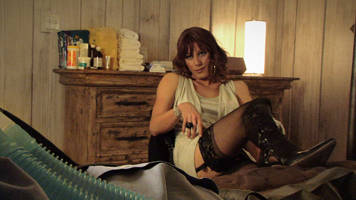 KH: Fourplay: San Francisco is based on life stories by a real cross-dressing sex worker who I met in San Francisco. Her name is Chloe. And the writer, Carlos Treviño, also met her and wanted to adapt one of these stories into something that was changed, and was different from the original story, but honored the work that this person did. And I think by coming into contact with Chloe my conceptions of sex work changed, and I wanted to offer up an experience for an audience where their stereotypes about the drug-addled streetwalker who’s full of shame, and you know…
KH: Fourplay: San Francisco is based on life stories by a real cross-dressing sex worker who I met in San Francisco. Her name is Chloe. And the writer, Carlos Treviño, also met her and wanted to adapt one of these stories into something that was changed, and was different from the original story, but honored the work that this person did. And I think by coming into contact with Chloe my conceptions of sex work changed, and I wanted to offer up an experience for an audience where their stereotypes about the drug-addled streetwalker who’s full of shame, and you know…
PS: Going down the downward spiral…
KH: …downward spiral, is beat up, is transported cross-country in the back of a truck. Which happens! Like I mean I’m not going to also say that streetwalking…
PS: …not that that doesn’t happen…
H2N: I think that happened to Christeene…
PS: Phoenix from the flame!
KH: The world that Chloe operates within is a very privileged place in the hierarchy of sex work. Chloe works for himself. Chloe at this point in his career has a very select list of clients. But this story, the real story, was about a mother who arranged a session for her son who was a paraplegic, and we adapted it into a story of a wife arranging a session for her quadriplegic husband. And we found this creature, Paul, [all laugh] who was able to channel Chloe. One wonderful thing was Chloe was actually a consultant on the project too, and Paul got to spend some time with Chloe in San Francisco.
PS: And still do—we’re bosom buddies now.
KH: The wardrobe is provided by Chloe…
PS: It was really kind of uncanny. We are the same size—shoes, clothes. We kind of look alike as males—not as females! [PS laughs] But it is fun when we go out together as females. Yeah, when I jumped into it, it was not for all of the reasons of justifying this idea of sex work being—for me as a performer, it was to be able to jump into some really rich material, and speak with someone and ask any question I wanted to. You know, Kyle said, “Call Chloe,” and I was like, “Uhhhh,” and he said, “Ask Chloe anything you need to know.”
KH: What was the first question you asked?
PS: Well you inspired the question—I said “Chloe—what’s in your purse? Right now, what do you keep in your purse?” And I thought that was a really good intro and it really pleased Chloe. And uh yeah it was a really good opportunity; I love soaking up anything. I’m a voyeur too. No, I like to get peeked at myself. I wanna swim in it, you know? I’ll drink the water, I wanna get in there, and this was rich stuff, so once all of that took place the rest of it was golden because it was a very small crew. The team was amazing and it was a lot of people from Austin, it was our family of people that we knew; I was just getting to know you and PJ [Raval].
KH: I think we were sizing each other up, too. I mean I had seen Paul as a performer in a persona he did called Rebecca Havemeyer, which is a very broad… she’s a broad broad.
PS: Very Dame Edna, like that lineage of drag.
KH: And we had Paul come in for an audition and do something very simple with makeup and sort of change intentions and we realized he’s a really great performer; he can inhabit something and live and not be projecting out. And I think for Paul, he had a lot of reservations about, “Are these people exploitative? Are they going to show me in compromising positions, or, you know, make fun of people through this story?” ‘Cause you know, there are humorous situations that occur over the course, but, “How are they going to handle this?” And I think we gained each other’s trust in the course of making the work.
PS: And like Kyle said, as a director he wants to make an environment that will inspire the performer, to feel safe and give what they have to give, and I had a lot of reservations also just about the script, like the content of it, what I had to do, and the first thing that I thought about was my family. Like, shit, I knew that this film would go to festivals; I knew that it would get a lot of attention. And that’s something—my family’s always been very supportive of me, they always have been, I’m very fortunate, very lucky, and that was the hardest thing for me, was to accept the script and to say I’m going to put myself into this character. I loved the character, I loved everything about it—but the actions that take place within the script.
KH: The sex work.
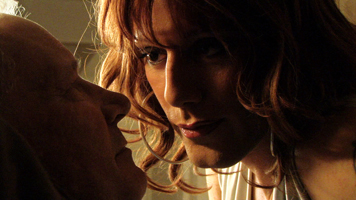 PS: The sex. And the actual act that is performed, the performance of that act was like, “Whoa. You want me to do what?” And someone’s gonna see this and you know, he, Kyle, created an environment that was perfect to walk into and to feel okay and to know that it was going to be presented in the best way possible. To reach the people in the best way possible. And my parents know I did it; I told them they are never to see it [all laugh]. Well because I know my parents! They’re like farmers and they’re ol’ coon-asses from Louisiana and I was like all I need from you is—I don’t need you to see this stuff, I don’t need you to understand it; I need you to support it. And if anyone ever asks you if you are Christeene’s father, or if you are that actor from Fourplay’s father, or if you are Christeene’s mother, I want you to say yes and I want you to be proud. And they’re like, “Yes.” Because my dad feels bad, he’s like you know he says, “I wish I understood what it is that you’re doing. I wish I got it.” And I say, “Dad, you don’t have to understand it; if you did there’d be something wrong with you.” [all laugh] “You just have to support it and you have to love me, and you have to understand and trust it. I would never do anything to hurt you, or to hurt myself, and this is the real deal.” And I think that that’s why I walked into that film. ‘Cause I knew that I could say that to my parents. ‘Cause I knew that what I was getting from him [KH] and the group would justify that. And it did: I think it’s evident, it’s there. That’s very important to me.
PS: The sex. And the actual act that is performed, the performance of that act was like, “Whoa. You want me to do what?” And someone’s gonna see this and you know, he, Kyle, created an environment that was perfect to walk into and to feel okay and to know that it was going to be presented in the best way possible. To reach the people in the best way possible. And my parents know I did it; I told them they are never to see it [all laugh]. Well because I know my parents! They’re like farmers and they’re ol’ coon-asses from Louisiana and I was like all I need from you is—I don’t need you to see this stuff, I don’t need you to understand it; I need you to support it. And if anyone ever asks you if you are Christeene’s father, or if you are that actor from Fourplay’s father, or if you are Christeene’s mother, I want you to say yes and I want you to be proud. And they’re like, “Yes.” Because my dad feels bad, he’s like you know he says, “I wish I understood what it is that you’re doing. I wish I got it.” And I say, “Dad, you don’t have to understand it; if you did there’d be something wrong with you.” [all laugh] “You just have to support it and you have to love me, and you have to understand and trust it. I would never do anything to hurt you, or to hurt myself, and this is the real deal.” And I think that that’s why I walked into that film. ‘Cause I knew that I could say that to my parents. ‘Cause I knew that what I was getting from him [KH] and the group would justify that. And it did: I think it’s evident, it’s there. That’s very important to me.
H2N: And what about for you, in the film, I guess the final catharsis—I don’t wanna give it away, but it has to do with…
PS: Oh, when Nell Carter comes out and does that lap dance? [all laugh]
H2N: Right! But yeah, she’s able to give this man a full—on a lot of different levels—sexual experience. She succeeds, and this bond is created between them, at least in the moment, so how did you go about achieving that, or when did you know that you’d nailed it?
KH: For me as a director, I try to be the best audience I possibly can be at the moment, and while we were filming that scene there were certain moments where, you know, I would tear up and cry, like when you witness somebody really giving a gift to someone else, even if it’s in pantomime, and I think the best truths that we tell ourselves are inside stories that are lies, that are fictions, ‘cause you can’t sort of deal with it in a documentary, let’s say. You know it, and so I just try to keep my bullshit meter finely tuned, and I try to keep open, as I get older, to still emotionally always be available and ready to laugh or cry, whether I stick my fist in my mouth if I’m about to laugh because I don’t wanna blow a take, but you know I’m there to witness their performance, and I think that’s what helps—if I were to give any direction to young directors—that’s what helps performers the most, is to have this very active witness who—there’s not a whole lot of audience for them to do what they do, it’s not a theater production where a whole group of people are gonna erupt in laughter, or start crying, and they’re not gonna be able to feed off that, but if you can be the best audience that you can be for them there is that reciprocal energy that goes on that makes a magical take occur.
PS: And I would like to convey to directors… [KH laughs] that when you ask a performer to do another take, 20 times the same take, let them know why you’re asking them to do that take. ‘Cause you know Kyle’s a great director, I didn’t know him and I had to learn his style. And Kyle likes you to do the same scene 20 frickin’ times, and what I didn’t understand when we first started shooting—I was like, “Holy shit, what am I doing wrong?”
KH: Oh that’s the first scene that we did. It’s like coming out of a boutique, which didn’t even make it into the film…
PS: Thank God, because I was like, “Uhuhuh,” sweating.
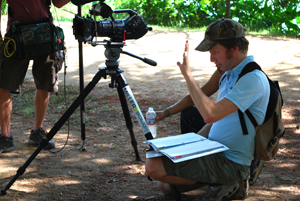 KH: You know I often start out with something trivial, but it allows the actors to inhabit really basic actions, and you know this idea that directors always know what they want, and all we’re doing is setting up an experience for a pre-formulated end result I think is really B.S.; I think the best work is—directors are getting up to speed, with watching people and trying to figure out how can I help each individual performer in their own way, and let’s try to make this scene interesting. I often direct scenes with three or four intentions: okay we did it that way, we did it with these given circumstances; okay let’s shoot it again, so that we’re shooting rehearsals, and it’s not just this roadmap where I have this end, magic, a-ha result.
KH: You know I often start out with something trivial, but it allows the actors to inhabit really basic actions, and you know this idea that directors always know what they want, and all we’re doing is setting up an experience for a pre-formulated end result I think is really B.S.; I think the best work is—directors are getting up to speed, with watching people and trying to figure out how can I help each individual performer in their own way, and let’s try to make this scene interesting. I often direct scenes with three or four intentions: okay we did it that way, we did it with these given circumstances; okay let’s shoot it again, so that we’re shooting rehearsals, and it’s not just this roadmap where I have this end, magic, a-ha result.
PS: And it’s candy for a performer. Once I figured it out, it was like oh, he wants me to frickin’ do it a million times…
KH: Listen, I tell all my actors that after working with you, you helped me articulate to them that this is playtime…
PS: You’re not doing something wrong; I want you to go crazy. And he encourages the performer to like—“It’s Romper Room time, let’s go crazy.” And to have that, like, “Oh you’re gonna let me do it this many times in this many different ways?” ‘Cause you know your director’s searching for something, so then you’re like, “What can I pull out of my bag for my director? ‘Cause I’m gon’ mess him up.” You know, and it’s exciting, and working with Kyle is like that, it’s like, “Do it again, and what are you gonna give me now?” Not like, “You better give me something now,” it’s, “What are you gonna give me now?” And it’s fun.
KH: I try.
H2N: So what are you gonna do next?
KH: I am working on another project with Carlos, a script that he’s writing, a biopic on Emily Dickenson, that hopefully will shatter a lot of stereotypes that we have about her and her life during the very formative, early years. Before she went into her sort of seclusion and isolation. And it involves a romantic triangle that she had with the wife of her brother. And I love Emily Dickenson: she’s a fierce, badass American artist who spoke her mind and found a way to create earth-shattering work that no one was giving any respect to, and had the forethought to put it away in this sort of capsule of her little hope chest in time, and it was rediscovered like unearthing a pyramid or something after her death. I work in film, so I can’t have that luxury—I need people to give me money! [KH laughs] I can’t hand-paint stills and put them away in a little chest, but yeah, I hope that film gets made, and it’s gonna need a lot more money than I’ve worked with in the past.
H2N: Any thoughts of working together on anything?
KH: Well we’re gonna cast Paul as Emily Dickenson! [all laugh]
PS: Hello, I’m Emily Dickenson.
KH: So you know there’ll be that. No…
PS: I think we come across each other when it’s supposed to happen. I think we like working with each other and it’s like when the planets line up properly, there we are; let’s do it. In the meantime, I’m workin’ with his husband. I got him half-naked on the stage, runnin’ around, so we’re in close proximity to each other’s work…
KH: We’re all up in it. [KH laughs]
PS: Yeah, we’re all up in it. We all pee in each other’s pools. That’s how I like to describe Austin.
KH: Swamp wisdom.
PS: Pearls from the swamp.
— Paul Sbrizzi








